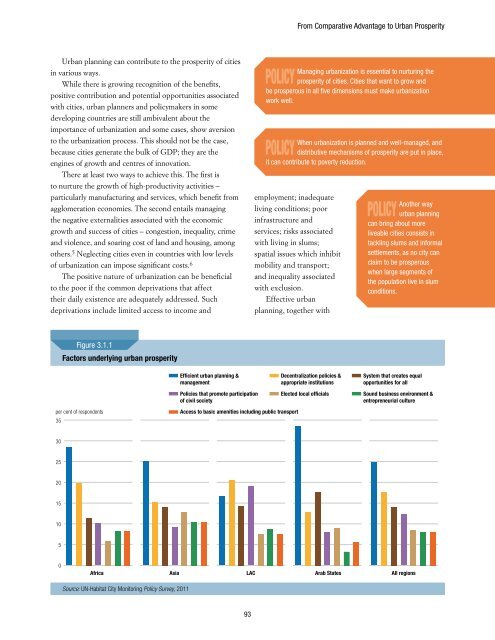state of the world's cities 2012/2013 - United Nations Sustainable ...
state of the world's cities 2012/2013 - United Nations Sustainable ...
state of the world's cities 2012/2013 - United Nations Sustainable ...
Create successful ePaper yourself
Turn your PDF publications into a flip-book with our unique Google optimized e-Paper software.
From Comparative Advantage to Urban ProsperityUrban planning can contribute to <strong>the</strong> prosperity <strong>of</strong> <strong>cities</strong>in various ways.While <strong>the</strong>re is growing recognition <strong>of</strong> <strong>the</strong> benefits,positive contribution and potential opportunities associatedwith <strong>cities</strong>, urban planners and policymakers in somedeveloping countries are still ambivalent about <strong>the</strong>importance <strong>of</strong> urbanization and some cases, show aversionto <strong>the</strong> urbanization process. This should not be <strong>the</strong> case,because <strong>cities</strong> generate <strong>the</strong> bulk <strong>of</strong> GDP; <strong>the</strong>y are <strong>the</strong>engines <strong>of</strong> growth and centres <strong>of</strong> innovation.There at least two ways to achieve this. The first isto nurture <strong>the</strong> growth <strong>of</strong> high-productivity activities –particularly manufacturing and services, which benefit fromagglomeration economies. The second entails managing<strong>the</strong> negative externalities associated with <strong>the</strong> economicgrowth and success <strong>of</strong> <strong>cities</strong> – congestion, inequality, crimeand violence, and soaring cost <strong>of</strong> land and housing, amongo<strong>the</strong>rs. 5 Neglecting <strong>cities</strong> even in countries with low levels<strong>of</strong> urbanization can impose significant costs. 6The positive nature <strong>of</strong> urbanization can be beneficialto <strong>the</strong> poor if <strong>the</strong> common deprivations that affect<strong>the</strong>ir daily existence are adequately addressed. Suchdeprivations include limited access to income andpolicyManaging urbanization is essential to nurturing <strong>the</strong>prosperity <strong>of</strong> <strong>cities</strong>. Cities that want to grow andbe prosperous in all five dimensions must make urbanizationwork well.policyWhen urbanization is planned and well-managed, anddistributive mechanisms <strong>of</strong> prosperity are put in place,it can contribute to poverty reduction.employment; inadequateliving conditions; poorinfrastructure andservices; risks associatedwith living in slums;spatial issues which inhibitmobility and transport;and inequality associatedwith exclusion.Effective urbanplanning, toge<strong>the</strong>r withpolicyAno<strong>the</strong>r wayurban planningcan bring about moreliveable <strong>cities</strong> consists intackling slums and informalsettlements, as no city canclaim to be prosperouswhen large segments <strong>of</strong><strong>the</strong> population live in slumconditions.Figure 3.1.1Factors underlying urban prosperityper cent <strong>of</strong> respondents35Efficient urban planning &managementDecentralization policies &appropriate institutionsPolicies that promote participation Elected local <strong>of</strong>ficials<strong>of</strong> civil societyAccess to basic amenities including public transportSystem that creates equalopportunities for allSound business environment &entrepreneurial culture302520151050Africa Asia LAC Arab States All regionsSource: UN-Habitat City Monitoring Policy Survey, 201193





